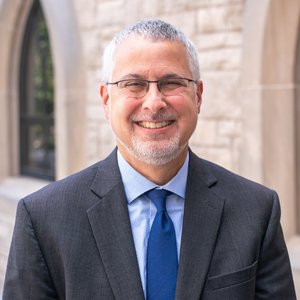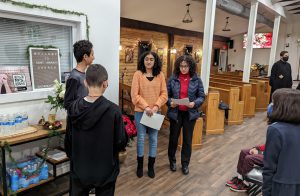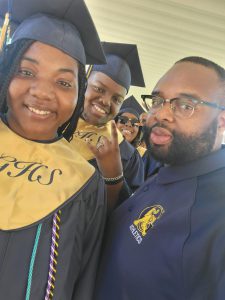At Pittsburgh Seminary, we seek to participate in God’s ongoing mission in the world by seeing and getting to know people as our neighbors. Challenged by Jesus’ parable of the Good Samaritan and inspired by Mr. Fred Rogers ’62, who sang, “I have always wanted to have a neighbor just like you!”, I am writing this blog to introduce you to some of my neighbors, whom I want you to know. They are students in our Doctor of Ministry (D.Min.) Program, for which I am honored to serve as the director. They work with diverse populations, whom they have come to see as neighbors and care for lovingly. I hope by the end of this series, you will get to know our doctor of ministry students, their ministries, as well as see those whom they serve as siblings in Christ, as neighbors near and far.
I’d like to introduce you to my neighbor Paul Ytterock ’23. Paul grew up in Detroit, graduated from Western Theological Seminary in Holland, Mich., and is ordained in the Presbyterian Church (USA). He served First Presbyterian Church of Dearborn for 13 years as director of Christian education, and currently, he serves First Presbyterian Church of Flint as associate pastor. For 16 years, he has witnessed the church’s committed partnership with the Flint community, a vibrant partnership since 1837. Paul completed his D.Min. in Parish Risk in 2023. His final project, entitled “One Small Step: Growing as God’s Reconciled Community,” focused on “a particular congregation, situated in the urban context of downtown Flint, Mich., exploring how the way of Jesus might guide the way we engage people on the margins in our own context.” –The Rev. Dr. Donna Giver-Johnston, Director of the Doctor of Ministry Program
A Sidewalk Full of Neighbors
 Right now I’m looking out my office window. It’s raining. Cracked open just a bit, the window allows me to enjoy the outdoor sounds and the cool 52° air. Surprisingly, the maple tree towering over the garden entrance that divides the office and sanctuary sections of the building is still clinging to its rusty leaves tinted in dull reds and drab greens. Two crabapple trees are leaf-free but bowed down with berries. After the morning’s gusty winds, leaves are strewn about the garden and across the front lawn. The brick pavement of Saginaw Street glistens with rainwater, and the passing traffic makes that mesmerizing sound of tires rolling over the wet roadway and splashing through small puddles. People adorned in all their variety pass along the sidewalk.
Right now I’m looking out my office window. It’s raining. Cracked open just a bit, the window allows me to enjoy the outdoor sounds and the cool 52° air. Surprisingly, the maple tree towering over the garden entrance that divides the office and sanctuary sections of the building is still clinging to its rusty leaves tinted in dull reds and drab greens. Two crabapple trees are leaf-free but bowed down with berries. After the morning’s gusty winds, leaves are strewn about the garden and across the front lawn. The brick pavement of Saginaw Street glistens with rainwater, and the passing traffic makes that mesmerizing sound of tires rolling over the wet roadway and splashing through small puddles. People adorned in all their variety pass along the sidewalk.
First Pres. is situated one block from the county sheriff’s office and district court—two blocks from the county circuit court, jail, and administration offices, as well as City Hall and all the other municipal offices. It’s a good guess that in the usual mix of shop owners, shoppers, and folk headed to lunch meetings and business appointments downtown, the walkers include lawyers, plaintiffs, defendants, court officers, jurors, and city, county, and social agency workers. Some are dressed in a t-shirt, some bundled in a winter coat; some have nothing in their hands, others hold papers, parcels, or briefcases; some walk playfully arm-in-arm, some all alone; some swagger purposefully with a steely gaze while others schlep their bodies along, their glazed-over eyes betraying their oblivion to the fact that they too have been written into the wildly beautiful symphony sounding that very moment just outside my window.
 It’s four steps to get up to the garden entrance—an arched, partially covered stone porch that measures about 24 x 30 ft. Often, folk who live on the street or in shelters take refuge in its space during inclement weather. Others will take lodging under its canopy for a night or more, the space providing some privacy. For the past week, a young couple has set up a makeshift tent in its confines, enclosing half of the space and covering the cold, stone ground with blankets and sleeping bags to afford not only a bit more privacy but also a sense of enclosure and security. “Lexi,” the young woman, tells us she is about two weeks away from getting her Section 8 housing voucher, and three weeks from giving birth to their first child. We assure them they don’t need to leave, but also encourage them with options for safer and more comfortable shelter during the coming cold spell and discomforts of being heavy with child. They know the options but do not want to be separated from one another, which would be their only choice with the available shelter sites.
It’s four steps to get up to the garden entrance—an arched, partially covered stone porch that measures about 24 x 30 ft. Often, folk who live on the street or in shelters take refuge in its space during inclement weather. Others will take lodging under its canopy for a night or more, the space providing some privacy. For the past week, a young couple has set up a makeshift tent in its confines, enclosing half of the space and covering the cold, stone ground with blankets and sleeping bags to afford not only a bit more privacy but also a sense of enclosure and security. “Lexi,” the young woman, tells us she is about two weeks away from getting her Section 8 housing voucher, and three weeks from giving birth to their first child. We assure them they don’t need to leave, but also encourage them with options for safer and more comfortable shelter during the coming cold spell and discomforts of being heavy with child. They know the options but do not want to be separated from one another, which would be their only choice with the available shelter sites.

Who is my neighbor? In one way, all those people walking and driving up and down Saginaw Street might be included. With all our differences, we are cut from the same cloth, and as such are bound to one another in a broader arena than space and time govern. Though I am aware of them only as nameless, faceless persons, the fact that they too are made in God’s image fills me with an empowering love to work in ways available to me for their good—to act toward every person in each brief encounter with words and actions that affirm the dignity of their being. But it is the ones with whom I have been given the opportunity to share more intimate space—Lexi and Adam on the garden porch, the 120+ low-income, sheltered, and homeless who come with a hunger for food and fellowship every Sunday morning when First Pres. serves up a neighborhood breakfast feast, the strangers and the familiar ones (“frequent flyers”) who come to the church building during the week asking to talk with a pastor, the former inmate working on reentry who needs documents, guidance, and prayer and comes to the church for assistance securing that—with these come a special call to be a beacon of hope and love shining brightly and pointing to the One who not only created them but meets them in Christ to pitch a tent with them.
Sometimes, the closer we are to one another, the more difficult it is to be a good neighbor. But to do anything less would be to turn our backs on Christ himself, who, “lovely in limbs, and lovely in eyes not his” plays “to the Father through the features of men’s faces” in ten thousand places. [1]
 The Rev. Dr. Paul Ytterock ’23 is associate pastor at First Presbyterian Church of Flint (Mich.), a congregation which has partnered with the Flint community since 1837, where he has served for 16 years. Previously, he served First Presbyterian Church of Dearborn (Mich.) for 13 years as director of Christian education. Paul grew up in Detroit, graduated from Western Theological Seminary in Holland, Mich., and is ordained in the Presbyterian Church (USA). He holds a D.Min. in Parish Risk from Pittsburgh Theological Seminary.
The Rev. Dr. Paul Ytterock ’23 is associate pastor at First Presbyterian Church of Flint (Mich.), a congregation which has partnered with the Flint community since 1837, where he has served for 16 years. Previously, he served First Presbyterian Church of Dearborn (Mich.) for 13 years as director of Christian education. Paul grew up in Detroit, graduated from Western Theological Seminary in Holland, Mich., and is ordained in the Presbyterian Church (USA). He holds a D.Min. in Parish Risk from Pittsburgh Theological Seminary.
[1] Gerard Manley Hopkins, The Poems of Gerard Manley Hopkins, ed. W.H. Gardner and N.H. MacKenzie. (NY: Oxford University Press, 1967), 90.
Read Next




1 thought on “Who Is My Neighbor? The Rev. Dr. Paul Ytterock on the Saginaw Street Walkers and Christ in the Stranger”